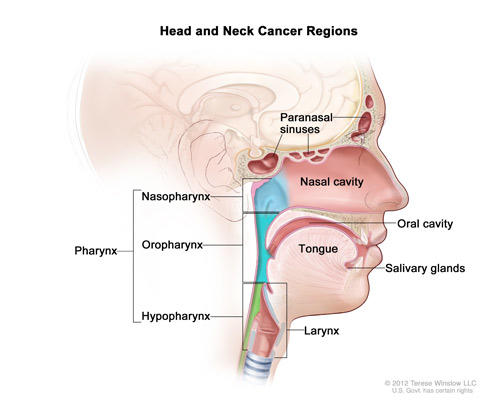FDA Approves Pembrolizumab for Head and Neck Cancer
, by NCI Staff
UPDATE: On July 24, 2017, Merck reported that the phase III clinical trial launched to confirm the clinical benefit of pembrolizumab in patients with head and neck cancer, the KEYNOTE-040 trial, did not meet its primary endpoint of improved overall survival. The company said it will provide a comprehensive analysis of the data from the trial at an upcoming medical meeting.
The announcement will not affect the drug’s current accelerated approval status. FDA has more information on the steps and requirements companies must abide by following a drug approval on its web site.
The Food and Drug Administration (FDA) approved pembrolizumab (Keytruda®) on August 5 for the treatment of some patients with an advanced form of head and neck cancer. The approval is for patients with recurrent or metastatic head and neck squamous cell carcinoma (HNSCC) that has continued to progress despite standard-of-care treatment with chemotherapy.
This is the third indication for which the drug has been approved. Pembrolizumab, part of a class of drugs known as immune checkpoint inhibitors, has also been approved to treat some patients with advanced melanoma and lung cancer.
The FDA granted accelerated approval based on early data from 174 patients with HNSCC enrolled in the nonrandomized KEYNOTE-012 trial. These patients had HNSCC that continued to grow and spread despite treatment with a platinum-containing chemotherapy; the majority of patients in the trial previously had received at least two different courses of treatment.
According to the FDA approval summary, 28 patients (16%) experienced a tumor response following treatment with pembrolizumab. In 23 (82%) of those patients, the tumor response lasted for 6 months or longer, and several have lasted for more than 2 years.
Several patients in the trial had a complete response, according to data from the trial presented in June at the American Society of Clinical Oncology annual meeting by trial investigator Ranee Mehra, M.D., of Fox Chase Cancer Center.
Patients with HNSCC whose tumors are positive for the human papillomavirus (HPV) typically have better outcomes after treatment with chemotherapy than patients whose tumors are HPV negative. In KEYNOTE-012, responses were seen in patients with HPV-positive tumors as well as in patients with HPV-negative tumors (24% and 16%, respectively), Dr. Mehra reported.
But, given the small number of patients in the trial, she cautioned against reaching any firm “conclusions about exact differences in response rate” based on tumor HPV status.
Common treatment side effects among patients in the trial included fatigue, decreased appetite, and shortness of breath. Serious side effects were rare and included pneumonia, vomiting, pleural effusion, and respiratory failure.
Under the accelerated approval of pembrolizumab, Merck, which manufactures pembrolizumab, must conduct a larger randomized trial to confirm that pembrolizumab has a clinical benefit—such as an improvement in progression-free or overall survival compared with standard therapy—in this patient population.
The company is currently conducting the phase III KEYNOTE-040 trial in patients with recurrent or metastatic HNSCC whose cancer has progressed on or after platinum-containing chemotherapy. The trial is no longer accepting new patients.
Immunotherapy Already Having Impact in HNSCC
Pembrolizumab—like another FDA-approved checkpoint inhibitor, nivolumab (Opdivo®)—targets the protein PD-1 on immune cells. However, nivolumab is not yet approved to treat patients with head and neck cancer. But at the American Association for Cancer Research annual meeting in April, data from an interim analysis of a phase III trial of nivolumab to treat patients with recurrent HNSCC showed that the drug improved overall survival and 12-month survival compared with treatment with methotrexate, docetaxel, or cetuximab. Based on these data, the FDA has granted nivolumab priority review for use in patients with recurrent or metastatic HNSCC and should announce its approval decision by November.
Even before the approval of pembrolizumab, clinical trial data involving anti-PD-1 agents presented at medical conferences was already affecting patient care, said Hyunseok Kang, M.D., M.P.H., of the Johns Hopkins Kimmel Cancer Center. Through early access programs run by the drugs’ manufacturers, Merck and Bristol Myers Squibb, oncologists have been treating patients with both drugs, Dr. Kang explained.
The approval, he said, “is great news for all patients with HNSCC. We have not had any proven standard second-line therapy in recurrent or metastatic HNSCC.
“It is very exciting that HNSCC responds to immunotherapy, and there are many ongoing research efforts to further enhance the effects of immunotherapy,” he continued. Current studies in HNSCC—and other cancers—include those to discover and validate biomarkers that identify which patients are most likely to respond to checkpoint inhibition and how to best combine these agents with other therapies, he said.
Oncologists treating HNSCC patients with immune checkpoint inhibitors will need to learn to manage the agents’ unique side effects, Dr. Kang noted. But, fortunately, he continued, “the oncology community is already familiar with anti-PD-1 agents and their toxicities from experiences” in other cancers, including melanoma and bladder, kidney, and lung cancer.
